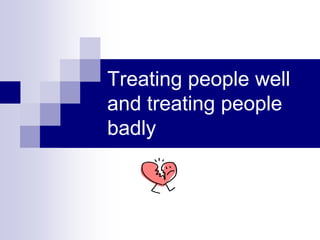
Treating Clients Ethically
- 1. Treating people well and treating people badly
- 2. Treating people well It is well understood that clients and patients should be treated well by care workers. An ethical reason for treating people well is that being a care worker implies having a duty of care. A practical reason is that clients who are treated well tend to behave more cooperatively, recover more quickly and have fewer problems.
- 3. Treating people well involves trying to provide life quality factors, e.g. ensuring that people have occupation or privacy It is not always possible to do this, e.g. drilling a tooth may be painful and uncomfortable!!
- 4. It is a good idea to think about the long term effects of treatment, i.e. that whilst treatment may be uncomfortable or painful it will mean a better quality of life eventually. A care worker should think carefully about the needs of the client or patient and take whatever action seems to give the best outcome.
- 5. Your examples Discuss how care workers can provide life quality factors in these care settings: HospitalA & E department Day nursery Residential home for elderly people You will need to think back to how these can be lacking in some care situations.
- 6. Treating people badly In practice there are many ways in which clients or patients are sometimes treated badly Neglect – means ignoring or otherwise failing to attend to a person’s needs. Physically this may involve not feeding a person. Psychologically it may mean not using effective communication or giving social support.
- 7. Think of another example of physical and psychological neglect.
- 8. Rejection – means showing the client that the care worker does not accept responsibility for caring for them Hostility – means expressing dislike or aggression towards a client, by verbal or non-verbal communication or unsympathetic treatment
- 9. Can you think of a way that a care worker could show rejection to a client? When might a client be hostile towards a care worker and vice versa?
- 10. Punishment – means responding to a client’s unwanted actions with unpleasant consequences, e.g. sending a patient to their room if they have disturbed or upset other residents or sending a child to the ‘naughty’ corner of the playroom. Punishment is always negative and inappropriate in care settings
- 11. Do you agree that there can never be a time when a care worker is justified in punishing a client? Think back to the ethical reason for treating people well – what is it?
- 12. Bullying – can take various forms including physical abuse or intimidation, e.g. using demeaning language or teasing a person Violence – means physically hurting a client, with or without producing detectable injury, e.g. a parent smacking a child
- 13. Which groups of vulnerable people are most at risk or being bullied by care workers? (What reports have you heard in the news?) Is violence ever ethical?
- 14. Discrimination Means acting differently towards certain people or groups of people. Not always negative, e.g. a GP has to discriminate between two patients, treating them differently according to their illness Most care workers are able to discriminate between clients in terms of their personalities
- 15. For example, you may speak light- heartedly to one client who enjoys this and in a more formal way to a different client Unfair discrimination involves treating people differently not because of their different needs, but because of their membership of certain groups
- 16. Types of unfair discrimination Sex discrimination - means treating people less well than others because of their sex. Discrimination on the grounds of sexuality means treating people differently because they are gay, straight, bisexual or asexual Ethnicity is a difficult concept and refers to the cultural origins of a person.
- 17. Ethnicity can refer to a nation, e.g. Australian, or to a race, e.g. ‘Caucasian’. It can also refer to a person’s religion when this is a major part of a particular culture, e.g. when a person thinks of himself or herself as a Muslim. For many people ethnicity is a mixture of nationality, race and religion.
- 18. Disability discrimination covers people who have a physical disability, a mental illness or emotional, behavioural or learning difficulty. Physical disability does not necessarily mean wheelchair bound but is any physical condition that prevents a person from doing something.
- 19. Social Class discrimination – treating people unfairly because they come from a different area – can be from a deprived area or can be the other way round with people discriminating against the rich.
- 20. Age discrimination – treating people unfairly because of their age might include not giving older people a job because they may not stay very long OR – not giving a younger person a job because they may be unreliable.
- 21. Complete the spider diagram with the correct words for treating people badly. Remember in this exam you will not gain marks for explanations without giving the exact term.